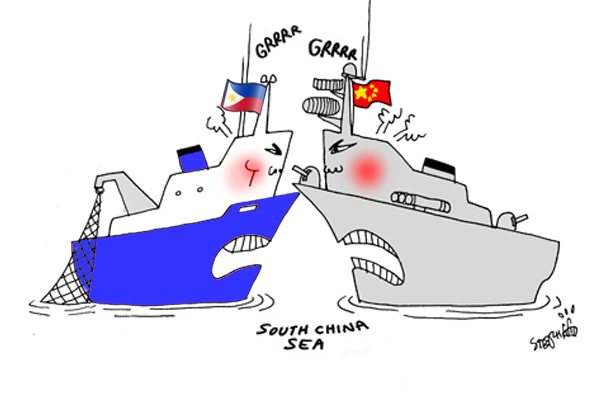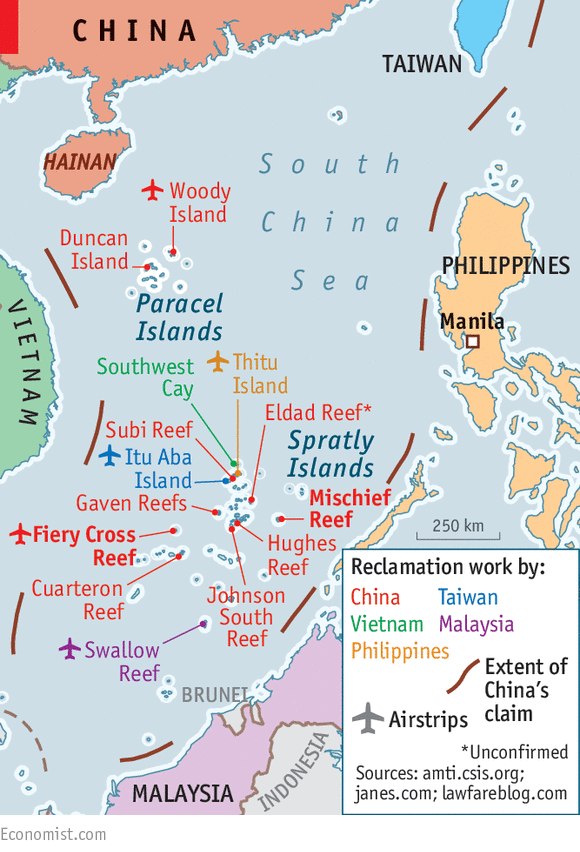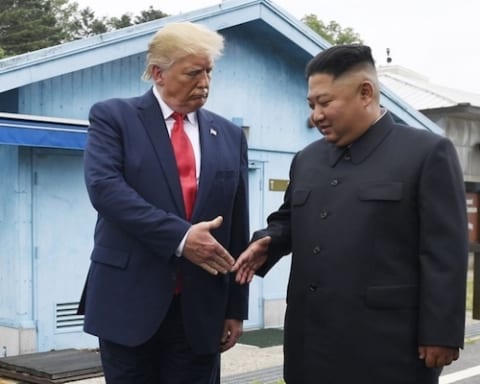South China Sea Rumblings After Hague Ruling
The unanimous decision at The Hague this week on the “China v. Philippines” dispute over the South China Sea affirmed that China has “no legal basis” to its claims. As reported, the UN tribunal ruled there is no evidence China has historically established exclusive control over the waters and resources of an area the size of Mexico, that sees more than 5 trillion in trade pass through annually. The decision has fueled tension and speculation throughout the region.
Following the ruling, Beijing threatened to declare an Air Defense Identification Zone (ADIZ) over the disputed waters in defiance of the PCA’s decision. An ADIZ would require all aircraft entering the designated airspace to identify themselves. Chinese Foreign Minister Liu Zhenmin backed up the threat by telling reporters on Wednesday, “Do not turn the South China Sea into a cradle of war.” On Thursday, Chinese Foreign Ministry spokesman Lu Kang continued the saber rattling, adding, “if anyone challenges China’s rights and interests by taking provocative actions … China will surely make a resolute response.”
The declaration of an ADIZ, not the first time China has done so, will likely increase tensions and provoke a similar response from other nations in the South China Sea. In 2013, when Beijing declared an ADIZ over the disputed Senkaku or Diàoyú Islands—which China, Taiwan and Japan all claim—the United States responded by sending two B52 bombers into the zone, without identifying themselves to China. The move by the US effectively made Beijing’s ADIZ null and void. However this time, Beijing might react more aggressively, potentially leading to a miscalculation.
While China’s stance appears confrontational, the nuances of the decision are not lost on other interested countries in the region.
Taiwan, a nation that claims the disputed Taiping Island, one of the largest of the Spratly Islands, as its own, has rejected the decision by the PCA. President Tsai Ing-wen said the ruling “seriously damaged” Taiwan’s rights and will not back down from the country’s claim to the South China Sea.
In remarks to navy sailors aboard a frigate before it left on a South China Sea patrol, Tsai Ing-wen added:
“This ship represents the Republic of China [Taiwan]. The uniform you are wearing represents the expectations of the people. The mission of this trip is to show the Taiwanese people’s determination to defend the country’s interests.”
Taipei also took the opportunity to make a clear distinction between Taiwan’s claims on Taiping Island, by pointing out that it is the only island in the region with a source of fresh water and farms that support life. According to their government, this adds to their claims of a special economic zone.
Taiwan’s Ministry of National Defense said it would continue to send planes and ships to the South China Sea on patrol missions to defend Taiwan’s territory and sovereignty.
Taiwan’s President has stated, “We are willing to join other countries in promoting peace and stability in the South China Sea under equal footing.” However, Tsai is facing criticism for the way she has handled the ruling and her “ambiguous” stance on the issue. President Tsai is said to be preparing a visit to Taiping Island to assert Taiwan’s sovereignty following the PCA’s decision.
Indonesia
Indonesia, which doesn’t have a claim to the Spratly’s, but does have overlapping claims with Beijing in the region, has taken a hawkish stance. After repeated clashes with Chinese vessels and the detention of one Chinese vessel, Indonesia is protecting its islands and special economic zone.
In an interview with Agence France-Presse, the present Minister of Defense of Indonesia, Ryamizard Ryacudu, said bolstering defenses around Indonesia’s Natuna Islands would involve deploying warships, an F-16 fighter jet, surface-to-air missiles, a radar and drones, and the construction of new ports and an airstrip. “This will be our eyes and ears,” the retired general said. “So that we can really see what is happening in the Natunas and the surrounding area in the South China Sea.”
Indonesia stated that the fortification on the Natunas and the surrounding area should be done in less than a year.
Vietnam
Vietnam, whose own South China Sea dispute with Beijing may also benefit from the PCA ruling, has welcomed the arbitration award.
On Wednesday, one Vietnamese fishing boat was chased down and rammed by two Chinese vessels. The wooden-hulled fishing boat sunk after being attacked. Vietnam has demanded that China provide urgent clarification.
As the Associated Press on Friday reported, Vietnam Foreign Ministry spokesman Le Hai Binh demanded Beijing cease actions that complicate the situation. “Despite the opposition of Vietnam and concerns by the international community, those actions conducted by China have seriously violated Vietnam’s sovereignty and are unlawful and cannot change the fact about Vietnam’s sovereignty over the Hoang Sa and Truong Sa archipelagoes,” Binh told reporters, referring to the Paracel and Spratly chains of islands and reefs.
Philippines
The Philippines, having filed the legal challenge against China in 2013, has urged Beijing to respect the ruling, calling for restraint and sobriety over the issue and showing willingness to go back to the negotiating table. Newly elected President Duterte, who has sought better relations with China to attract Chinese investment, may be better positioned to negotiate with Beijing with the PCA’s ruling on their side. But he has a rocky road ahead of him. Duterte planned to send former President Fidel Ramos to start the talks with China. Ramos, who served from 1992 to 1998, and is known to favor close ties with China, declined, citing age and other commitments.
On Thursday, Chinese Coast Guard vessels blocked Philippine fishing boats from approaching the disputed Scarborough Shoal. China also reportedly landed two civilian aircraft on its manmade island, in order to further bolster its claims.
Beijing even said it may build mobile nuclear power plants on the disputed island for civilian purposes, according to the website of the state-run Global Times, citing the China National Nuclear Corporation (CNNC). The plan doesn’t seem to be very well thought out, given the artificial islands are only a few meters above sea level. In an age of rising sea levels and typhoons endemic to the area, China would be responsible for contaminating the South China Sea.
In a move that can only be described as Beijing’s steadfast commitment to only negotiate on its own terms, Chinese Vice Foreign Minister Liu Zhenmin said China “will not allow any negotiation based on the ruling.” It is becoming increasingly clear that Duterte will have to put together a very skillful team of negotiators, re-engage Beijing, and not let China dictate the terms of the negotiation of any settlement.
ASEAN
The ruling on the South China Sea could dominate the upcoming meeting of the Association of Southeast Asian Nations (ASEAN), in Laos, which includes the Philippines, Malaysia, Indonesia and Vietnam. ASEAN was expected to weigh in on the ruling, yet has remained silent.
“ASEAN officials had prepared a draft text but there was no agreement to release a joint statement,” said a South-east Asian diplomat, adding that China was believed to have leaned on its ASEAN allies, Laos and Cambodia, to prevent a statement in the highly-charged affair, as reported in the APF.
The 10-member ASEAN block has faced issues of unity due to increasing pressure from China.
United States
As Reuters reported, The U.S. is using quiet diplomacy to persuade the Philippines, Indonesia, Vietnam and other Asian nations not to move aggressively and to capitalize on the ruling.
State Department spokesman Mark Toner spoke at a briefing on Wednesday: “This is a blanket call for quiet, not some attempt to rally the region against China, which would play into a false narrative that the U.S. is leading a coalition to contain China … What we want to see in this very tense part of Asia, of the Pacific, rather, is a de-escalation of tensions and we want to see all claimants take a moment to look at how we can find a peaceful way forward.”
Retired Admiral Dennis Blair, former Commander of the U.S. Pacific Command, appeared before a Congressional committee hearing on Wednesday stating that the U.S. should oppose some of China’s most extreme claims, by force if necessary. Blair pointed out that China’s rejection of the ruling could harm China’s reputation, and would make it more difficult for other nations, including its neighbors, to trust that China will adhere to any international treaties or deals it has made.
ASEM
It is expected Beijing would face an international dressing down on Friday at a gathering of leaders from across Asia and Europe. The Asia-Europe Meeting (ASEM) is an informal process of dialogue and cooperation, bringing together 30 European countries and 21 Asian countries. The ASEM dialogue addresses political, economic and cultural issues, with the objective of strengthening the relationship between the two regions, in a spirit of mutual respect and equal partnership.
Beijing had hoped that ASEM would be a forum to further showcase its “One Belt One Road” initiative. However, Beijing’s reaction to the ruling has left many nations wondering whether China can be trusted as a partner in trade deals. Beijing has expressed that ASEM is no place to discuss these issues, and will most likely avoid the topic.
Japan
Japan, having separate territorial disputes with Beijing, is expected to weigh in on the ruling. Prime Minister Shinzo Abe has stated, for now, he would “discuss the importance of reaching a peaceful resolution under the rule of law” in the South China Sea.
Do not turn the South China Sea into a cradle of war.
– Chinese Foreign Minister Liu Zhenmin
While China’s posturing may appear incendiary, defiance of the ruling is not without precedent. The United States, Russia and Britain have all defied decisions issued from The Hague.
China’s state-run Xinhua news agency reminded the United States this week that in 1986 the US thumbed its nose at the International Court of Justice, when it ruled that the US had violated international law by funding Contra rebels and mining ports in Nicaragua. The US refused to honor the ICJ decision, which granted an initial award of $370 million, and boycotted the proceedings. Following, the US maneuvered its permanent seat at the UN Security Council to veto measures mandating it follow the court’s ruling. Then US Ambassador to the UN Jeane Kirkpatrick dismissed the ICJ as a “semi-legal, semi-juridical, semi-political body, which nations sometimes accept and sometimes don’t.” The US ceased aiding the Contras only after Congress blocked the means to continue.
More recently, in 2003, the US Supreme Court openly defied an ICJ ruling requiring the US to review the death penalty of a Mexican national, who, upon arrest, hadn’t been informed of his right to communicate with the Mexican consulate. It wasn’t until the Governor of Oklahoma commuted his sentence to life imprisonment that the situation was reviewed using the court’s decision.
In August of last year, the PCA ordered Russia to pay compensation for seizing the Greenpeace vessel Arctic Sunrise, in international waters, and arresting the crew at gunpoint during a protest against an offshore oil platform. As the ship was flying the Dutch flag, the Netherlands filed the case. The PCA unanimously ruled that Russia acted in breach of the UN Convention on the Law of Sea. Russia, however, simply refused to participate in, or abide by the ruling, asserting the court had no jurisdiction, even ignoring the tribunal’s order that the crew be released while the dispute was being resolved.
In Mauritius v. United Kingdom, the British government refused to honor a 2015 PCA ruling holding that a declared marine reserve in the Indian Ocean, around the Chagos Achipelago, was illegal as a violation of the Law of the Sea. The tribunal unanimously ruled that the UK had breached Mauritius’ fishing rights, as it could not unilaterally declare marine protected areas.
 In addition to the precedent set by the US, Russia, and Britain, China purports its defiance is also, in part, justified by a political agreement signed between Manila and Beijing in 2002. This document, the Declaration of the Conduct of Parties (DOC) in the South China Sea, ensured that the Philippines—and the member nations of the Association of Southeast Asian Nations (ASEAN)—would resolve all South China Sea disputes via negotiations. With 11 signatures at the bottom of the agreement, the then-leaders of Brunei Darussalam, the People’s Republic of China, the Kingdom of Cambodia, the Republic of Indonesia, the Lao People’s Democratic Republic, Malaysia, the Union of Myanmar, the Republic of the Philippines, the Republic of Singapore, the Kingdom of Thailand, and the Socialist Republic of Vietnam all agreed to the following (excerpt) from Article 4 of the Document:
In addition to the precedent set by the US, Russia, and Britain, China purports its defiance is also, in part, justified by a political agreement signed between Manila and Beijing in 2002. This document, the Declaration of the Conduct of Parties (DOC) in the South China Sea, ensured that the Philippines—and the member nations of the Association of Southeast Asian Nations (ASEAN)—would resolve all South China Sea disputes via negotiations. With 11 signatures at the bottom of the agreement, the then-leaders of Brunei Darussalam, the People’s Republic of China, the Kingdom of Cambodia, the Republic of Indonesia, the Lao People’s Democratic Republic, Malaysia, the Union of Myanmar, the Republic of the Philippines, the Republic of Singapore, the Kingdom of Thailand, and the Socialist Republic of Vietnam all agreed to the following (excerpt) from Article 4 of the Document:
“The Parties concerned undertake to resolve their territorial and jurisdictional disputes by peaceful means, without resorting to the threat or use of force, through friendly consultations and negotiations by sovereign states directly concerned, in accordance with universally recognized principles of international law, including the 1982 UN Convention on the Law of the Sea.”
In bringing an arbitration case, the Philippines—whose Secretary of Foreign Affairs Blas F. Ople signed on the dotted line—effectively ignored diplomatic means as well as China’s stated willingness to commence negotiations “between directly concerned parties.”
To China’s credit—and citing the 2016 keynote address of Vice Foreign Minister of China Liu Zhenmin:
“China [has] demonstrated [a] spirit of equal consultation in its negotiations on resolving the land boundary issues with 12 neighbors. Among them, there are big countries and small countries, strong countries and weak countries. China settled boundary issues with every one of them under the principles of mutual respect and equal consultation in accordance with historical facts and international law. No one ever accused China of bullying smaller countries or resorting to coercion during the negotiations.”
China has also asserted in a JUL13 white paper statement that South China Sea disputes are inextricably bound to issues of sovereignty and, as such, such disputes are beyond the scope of the United Nations Convention of the Law of the Sea (UNCLOS), which the tribunal directly references in its decision.
China is not alone in holding this opinion. A former deputy legal advisor to the British Foreign Commonwealth Office, Chris Whomersley, states, “It is the terrestrial territorial situation that must be taken as a starting point for the determination of the maritime rights of a coastal state. It seemed unprecedented for an international tribunal to consider the status of a feature when the territorial sovereignty over that feature was disputed.”
Still, the Tribunal cites violations of UNCLOS—maintaining that the convention applies. China cites exemption clauses relieving the country from arbitration proceedings, under Art. 298, Section 2, Part XV. China also notes that man-made islands are not covered under UNCLOS and the US is not among the 160 countries to ratify UNCLOS, undercutting its ability to weigh in on the matter.
Amongst the projected UNCLOS violations the PCA cited, the tribunal argues that Articles 192 and 194 are in particular breach:
“China has violated its obligation under Articles 192 and 194 of [Unclos] to preserve and protect the marine environment with respect to fragile ecosystems and the habitat of depleted, threatened, or endangered species.
China has:
(a) built a large artificial island on Mischief Reef, a low-tide elevation located in the exclusive economic zone of the Philippines;
(b) caused permanent, irreparable harm to the coral reef ecosystem and
(c) permanently destroyed evidence of the natural condition of the features in question.”
Ultimately, China’s defiance of Tuesday’s ruling is not without its merits. In reality, nations—even large and powerful ones including the US, Britain, and Russia—frequently abide by international arbitration rulings in business conflicts but less frequently honor such decisions when issues impacting their sovereignty are invoked.
Given that the PCA at The Hague is essentially a “court of international opinion,” without any real enforceable ability to provide teeth to its decision, China is merely acting as many other superpowers throughout history have, demonstrating it is capable of pushing back amidst international pressure. In the interests of diplomacy and a real desire to resolve this dispute, China and its neighbors must be willing to peacefully negotiate over this conflict in the region.
Beijing must also realize that the ratcheting up of tensions, rhetoric or real, will only contribute to a further deterioration of international law, and China’s image in the eyes of the international community. The only way to save face and keep its territorial claims is to return to the negotiating table.
Raymond Pagnucco, with Anthony A. LoPresti, for Lima Charlie News.
Ray Pagnucco, Senior Correspondent, for Lima Charlie News, received his degree in Asian Studies (SUNY Purchase), before moving to Beijing, China to attend Beijing Sports University and Beijing Language and Culture University. There he began his career in television and has since worked as a cameraman, field producer and editor on various shows, including South Asian news channel Samaa Television, Fuji TV Network and Feature Story News, where he shot and edited for Channel News Asia and China Central Television-America. Raymond has contributed to Vice News, writing about Myanmar’s politics, the national ceasefire negotiations and ethnic armed groups. Raymond is currently based in Chiang Mai, Thailand.
Follow Raymond on Twitter @RPagnuccoLC
Lima Charlie provides global news, analysis and opinion by military veterans and service members Worldwide.
For up-to-date news please follow us on Twitter at @LimaCharlieNews
#LimaCharlie #LimaCharlieNews
Image credit: Stephff







![Blossoming Russo-Turkish alliance leaves U.S., NATO behind [Lima Charlie News]](https://limacharlienews.com/wp-content/uploads/2019/07/Russia-Turkey-alliance-leaves-U.S.-NATO-behind-480x384.png)



